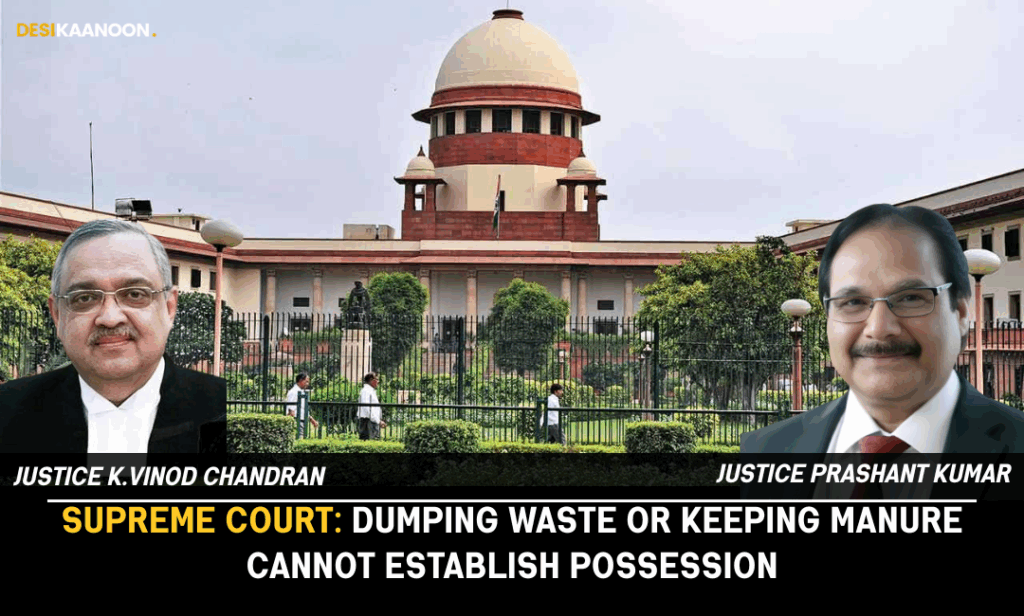Shreya Gupta
On 9th September, 2025, the Supreme Court dismissed an appeal in a suit for possession. The Court held that the mere presence of manure and dumped waste on a parcel cannot constitute a valid basis for finding adverse possession. This is especially true where the plaintiff’s case was that such waste was being thrown and manure kept on the land without permission.
The Division Bench comprising Justice Prashant Kumar Mishra and Justice K. Vinod Chandran noted that the Commissioner’s report dealing with the land marked “PCDF” only recorded manure and waste being kept there and observed that this alone could not support a finding of possession. Procedurally, the case came to the Supreme Court after the trial court and the first appellate court had concurrently rejected the plaintiff’s suit, but the High Court reversed those concurrent factual findings in a second appeal.
The appellants argued that although the sale deed described the plot as 150 square metres, the revenue records produced by the defendants showed vendor possession of only 109.70 square metres. They claimed that the remaining portion was an open space in the possession of the deceased eighth defendant. They also pointed out that the revenue records had been corrected after the defendants filed their written statement. Further, they contended that since the plaintiff did not seek recovery of possession, there was no question of law for the High Court to decide.
The plaintiff, by contrast, sought a declaration of ownership and possession with consequential injunction, pleaded that the disputed open land was contiguous to the built plot, alleged that the defendants were dumping waste and keeping manure there despite objections and threats, and maintained that the presence of manure/waste could not, by itself, establish possession. On examining the plaint and the trial court record, the Bench recorded that the eighth defendant failed to file a written statement and that only the ninth defendant contested adopting the objection to the injunction application as its written statement and that the trial court nevertheless found the plaintiff had not established title over either the built portion (“ABCD”) or the adjacent open plot (“PCDF”).
The Court observed that there was no justification for the trial court to disbelieve the plaintiff’s title to “ABCD” when a title deed existed. It upheld the corrected revenue entries produced by the plaintiff. The Court held that a correction made during the course of the suit was not, by itself, a reason to disbelieve the public record, unless the sanctity of that correction was disproved.
The Bench further found that the ninth defendant’s pleadings of partition and common use were unsupported. It noted, “But for the bland assertions of partition and common use, nothing is produced to establish the same, nor is anybody examined to substantiate the contentions.” Without evidence of an oral partition or a demonstrable connection to the vendor or his father, who was the original owner, the ninth defendant could not establish possession-in-common. Accordingly, the first appellate court’s reliance on Section 34 of the Specific Relief Act could not be sustained.
The Supreme Court concluded that the plaintiff’s vendor’s possession was proved. It also found that the plea of common use was demolished. The Court reiterated that the deceased first appellant, now represented by the second appellant, and appellants three to five had never contested the suit. Therefore, they could not properly prosecute an appeal based solely on the ninth defendant’s contentions. On that basis, the appeal was dismissed.
Bench: Justice Prashant Kumar Mishra and Justice K. Vinod Chandran
Case Title: Kisan Vithoba Aakhade v. Suresh Tukaram Nerkar
Case Number: Civil Appeal No. 720 of 2015
Click here to access the order
Instagram: Click here
LinkedIn: Click here
For Collaboration and Business: info.desikaanoon@gmail.com

